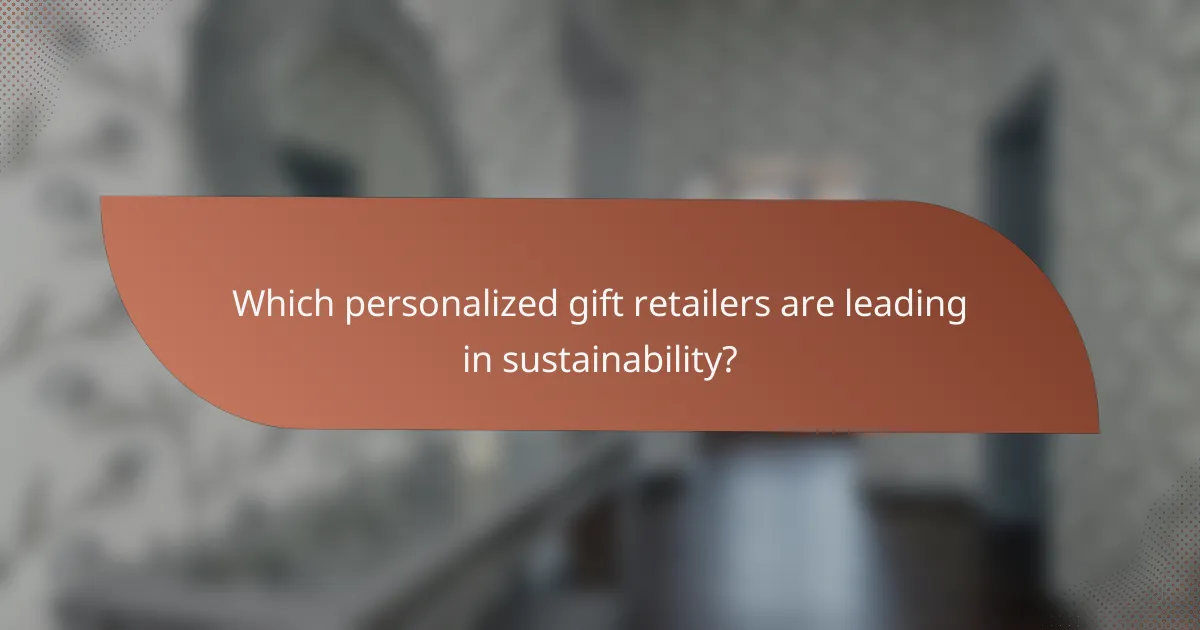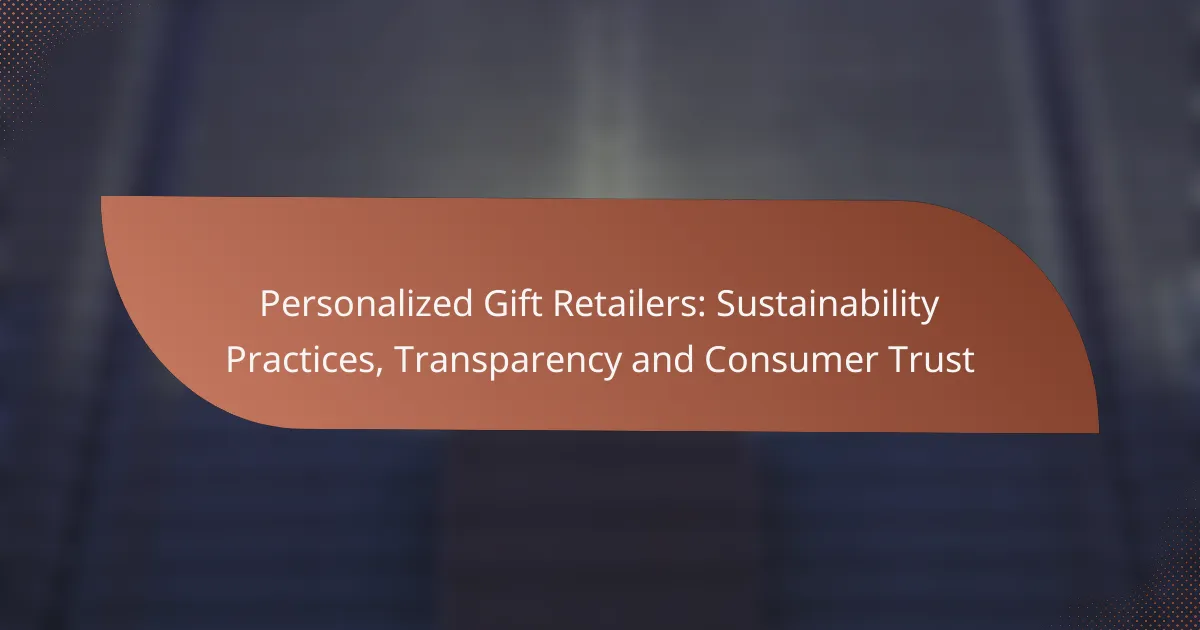Personalized gift retailers are increasingly prioritizing sustainability to reduce their environmental impact and foster consumer trust. By utilizing eco-friendly materials, ensuring ethical sourcing, and implementing transparency measures, these retailers not only enhance their brand reputation but also encourage customer loyalty through responsible practices.

How do personalized gift retailers implement sustainable practices?
Personalized gift retailers adopt various sustainable practices to minimize their environmental impact and enhance consumer trust. These practices include using eco-friendly materials, reducing carbon footprints, ensuring ethical sourcing, forming partnerships with sustainable brands, and initiating recycling and upcycling efforts.
Use of eco-friendly materials
Many personalized gift retailers prioritize eco-friendly materials, such as recycled paper, biodegradable plastics, and sustainably sourced wood. By choosing these materials, they reduce reliance on virgin resources and lower waste production. For instance, retailers may offer products made from organic cotton or bamboo, which have a smaller environmental footprint compared to conventional materials.
When shopping for personalized gifts, look for certifications like FSC (Forest Stewardship Council) for wood products or GOTS (Global Organic Textile Standard) for textiles to ensure that the materials are genuinely sustainable.
Reduction of carbon footprint
To reduce their carbon footprint, personalized gift retailers often optimize their supply chains and logistics. This can include local sourcing of materials and products, which minimizes transportation emissions. Some retailers may also invest in carbon offset programs to balance out their emissions by supporting renewable energy projects or reforestation efforts.
Consumers can support these initiatives by choosing retailers that transparently disclose their carbon reduction strategies and provide information on their shipping practices.
Ethical sourcing of products
Ethical sourcing is crucial for personalized gift retailers, as it ensures that products are made under fair labor conditions. Retailers often collaborate with suppliers who adhere to ethical labor practices, ensuring workers receive fair wages and work in safe environments. This commitment not only supports the workforce but also builds consumer trust.
When purchasing, check if the retailer provides information about their sourcing practices and any certifications that guarantee ethical standards, such as Fair Trade.
Partnerships with sustainable brands
Forming partnerships with sustainable brands allows personalized gift retailers to expand their eco-friendly offerings. These collaborations often include co-branded products that emphasize sustainability, such as gifts made from recycled materials or those that support local artisans. Such partnerships enhance the retailer’s credibility and appeal to environmentally conscious consumers.
Look for retailers that highlight their collaborations with well-known sustainable brands, as this can be a good indicator of their commitment to sustainability.
Recycling and upcycling initiatives
Recycling and upcycling initiatives are becoming increasingly popular among personalized gift retailers. Many offer programs that encourage customers to return used products for recycling or repurposing, reducing waste and promoting a circular economy. For example, some retailers may create new items from returned products, giving them a second life.
Consumers can participate in these initiatives by inquiring about return programs and choosing retailers that actively promote recycling efforts, ensuring their purchases contribute to sustainability.

What transparency measures do personalized gift retailers adopt?
Personalized gift retailers implement various transparency measures to build consumer trust and demonstrate their commitment to ethical practices. These measures include clear disclosures about product origins, sustainability reporting, consumer feedback mechanisms, and third-party certifications.
Clear product origin disclosures
Clear product origin disclosures inform consumers about where and how personalized gifts are made. Retailers often provide details on the sourcing of materials, the manufacturing process, and the labor conditions involved. This transparency helps consumers make informed choices and supports ethical purchasing.
For example, a retailer might specify that their wooden gifts are sourced from sustainably managed forests, ensuring that customers understand the environmental impact of their purchase.
Detailed sustainability reporting
Detailed sustainability reporting outlines the environmental and social impacts of a retailer’s operations. This can include information on carbon emissions, waste management, and resource usage. By publishing sustainability reports, retailers can showcase their efforts to minimize negative impacts and promote responsible practices.
Many retailers adopt annual reporting cycles, providing updates on their sustainability goals and progress. This practice not only enhances transparency but also holds companies accountable to their commitments.
Consumer feedback mechanisms
Consumer feedback mechanisms allow customers to voice their opinions and experiences regarding personalized gifts. Retailers often implement surveys, reviews, and ratings to gather insights on product quality and satisfaction. This feedback loop fosters transparency and encourages continuous improvement.
For instance, a retailer might invite customers to rate their products on a scale of one to five stars, providing valuable data that can guide future product development and service enhancements.
Third-party certifications
Third-party certifications serve as independent validation of a retailer’s sustainability claims and ethical practices. Certifications from recognized organizations can enhance consumer trust by assuring customers that products meet specific environmental and social standards.
Common certifications include Fair Trade, Forest Stewardship Council (FSC), and Global Organic Textile Standard (GOTS). Retailers displaying these certifications signal their commitment to responsible sourcing and production, making it easier for consumers to choose sustainable options.

How does consumer trust impact personalized gift retailers?
Consumer trust significantly affects personalized gift retailers by influencing purchasing decisions and brand loyalty. When customers feel confident in a retailer’s practices, they are more likely to buy, recommend, and return for future purchases.
Importance of brand reputation
Brand reputation plays a crucial role in establishing consumer trust. Retailers known for quality products and ethical practices tend to attract more customers. A strong reputation can lead to increased sales, while negative perceptions can deter potential buyers.
For personalized gift retailers, maintaining a positive brand image involves consistent product quality, excellent customer service, and adherence to sustainable practices. Regularly engaging with customers and addressing concerns can further enhance reputation.
Role of customer reviews
Customer reviews are vital for building trust in personalized gift retailers. Positive reviews can boost credibility, while negative feedback can raise red flags for potential buyers. Many consumers rely on reviews to gauge product quality and service reliability.
Retailers should actively encourage satisfied customers to leave reviews and respond promptly to any negative feedback. This engagement shows potential buyers that the retailer values customer input and is committed to improving their experience.
Impact of social media presence
A strong social media presence can enhance consumer trust for personalized gift retailers. Platforms like Instagram and Facebook allow retailers to showcase products, share customer testimonials, and engage directly with their audience. This interaction fosters a sense of community and transparency.
Retailers should maintain an active social media strategy that includes regular updates, promotions, and customer interactions. Authentic content that highlights sustainable practices can further strengthen trust and attract environmentally conscious consumers.
Trust-building through transparency
Transparency is essential for building trust with consumers in the personalized gift market. Retailers should openly share information about sourcing, production processes, and sustainability initiatives. This openness helps consumers feel more secure in their purchasing decisions.
Providing clear details about product materials, ethical sourcing, and manufacturing practices can set a retailer apart. Additionally, certifications or partnerships with recognized sustainability organizations can enhance credibility and appeal to eco-conscious shoppers.

What criteria should consumers consider when choosing sustainable personalized gifts?
Consumers should evaluate material sustainability, brand ethical practices, and product lifecycle when selecting sustainable personalized gifts. These criteria help ensure that the gifts are not only unique but also environmentally friendly and socially responsible.
Material sustainability
Material sustainability refers to the sourcing and composition of the materials used in personalized gifts. Look for products made from recycled, organic, or renewable resources, as these options typically have a lower environmental impact. Certifications like FSC (Forest Stewardship Council) for wood products or GOTS (Global Organic Textile Standard) for textiles can indicate sustainable practices.
When assessing materials, consider the durability and biodegradability of the items. Gifts made from biodegradable materials can reduce waste in landfills, while durable products can last longer, minimizing the need for replacements.
Brand ethical practices
Brand ethical practices encompass the social and environmental responsibilities of the companies producing personalized gifts. Research brands that prioritize fair labor practices, transparency in their supply chains, and commitment to reducing their carbon footprint. Brands that openly share their sourcing and manufacturing processes tend to build greater consumer trust.
Look for companies that engage in community support or charitable initiatives, as these practices often reflect a brand’s commitment to ethical standards. Certifications like Fair Trade can also provide assurance of ethical sourcing and production.
Product lifecycle
The product lifecycle includes all stages of a gift’s existence, from raw material extraction to disposal. Understanding this lifecycle can help consumers make informed choices about the sustainability of their purchases. Consider how long the product is expected to last and what happens to it at the end of its life.
Opt for gifts that are designed for longevity or can be easily recycled or repurposed. Brands that offer take-back programs or recycling options for their products can further enhance sustainability by reducing waste and encouraging responsible disposal.

Which personalized gift retailers are leading in sustainability?
Several personalized gift retailers are making significant strides in sustainability by adopting eco-friendly practices and transparent sourcing. Companies like Etsy, Zazzle, and Uncommon Goods are recognized for their commitment to sustainable materials and ethical production methods.
Key sustainability practices in personalized gift retail
Leading retailers often implement practices such as using recycled materials, minimizing waste, and ensuring ethical labor conditions. For instance, some brands prioritize biodegradable packaging and partner with suppliers who adhere to environmental standards.
Additionally, many retailers are adopting carbon offset programs to neutralize their environmental impact. This can include investing in renewable energy projects or supporting reforestation efforts.
Transparency in sourcing and production
Transparency is crucial for building consumer trust in personalized gift retailers. Companies that openly share information about their sourcing practices, production processes, and labor conditions tend to attract more environmentally conscious customers.
Retailers can enhance transparency by providing detailed product descriptions, including the origins of materials and the manufacturing process. Certifications from recognized organizations can also boost credibility.
Building consumer trust through sustainability
Consumers are increasingly looking for brands that align with their values, particularly regarding sustainability. Personalized gift retailers that demonstrate a genuine commitment to eco-friendly practices can foster stronger relationships with their customers.
To build trust, retailers should engage with their audience through social media and other platforms, sharing stories about their sustainability efforts and encouraging customer feedback. Regular updates on progress and challenges can further enhance credibility.
